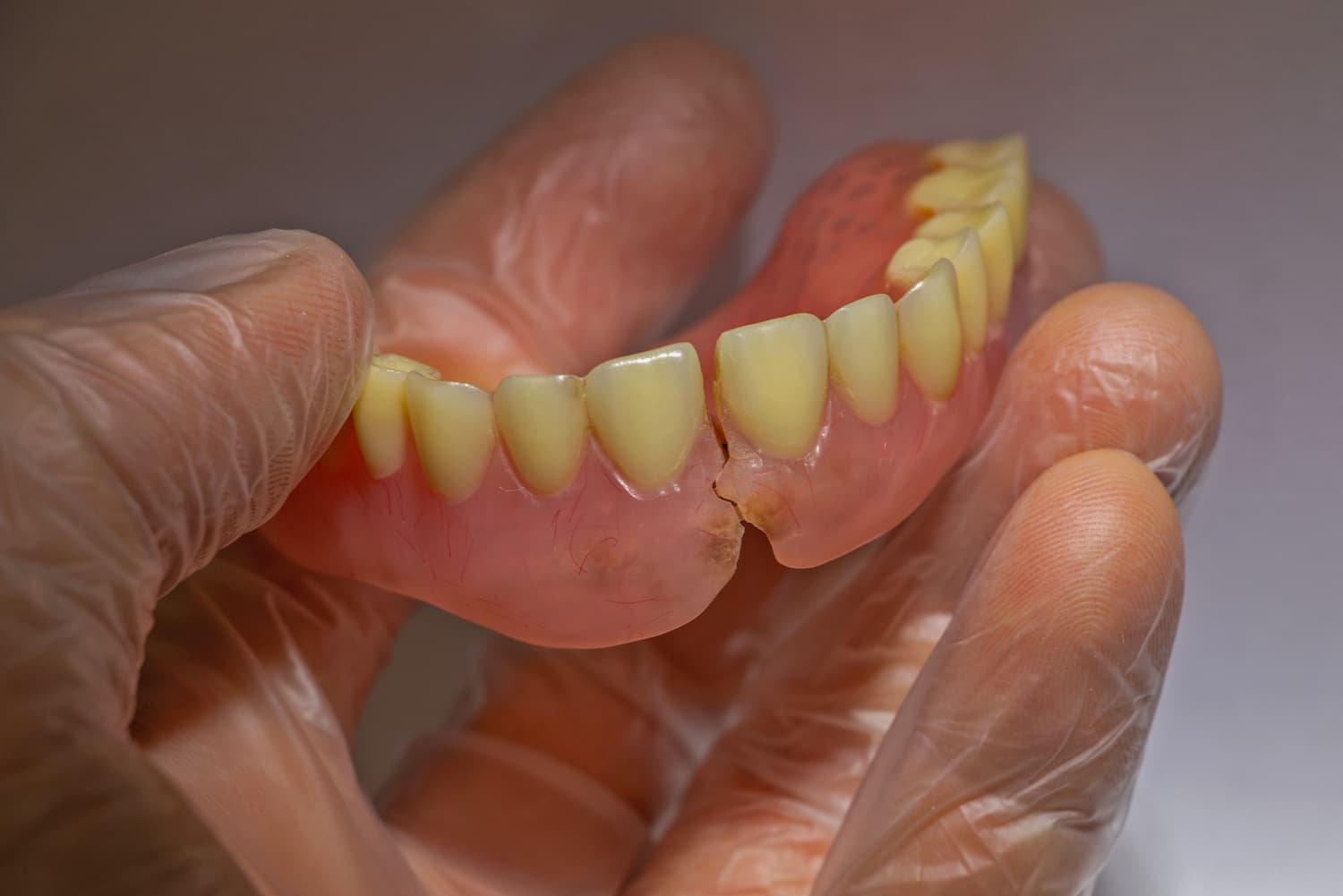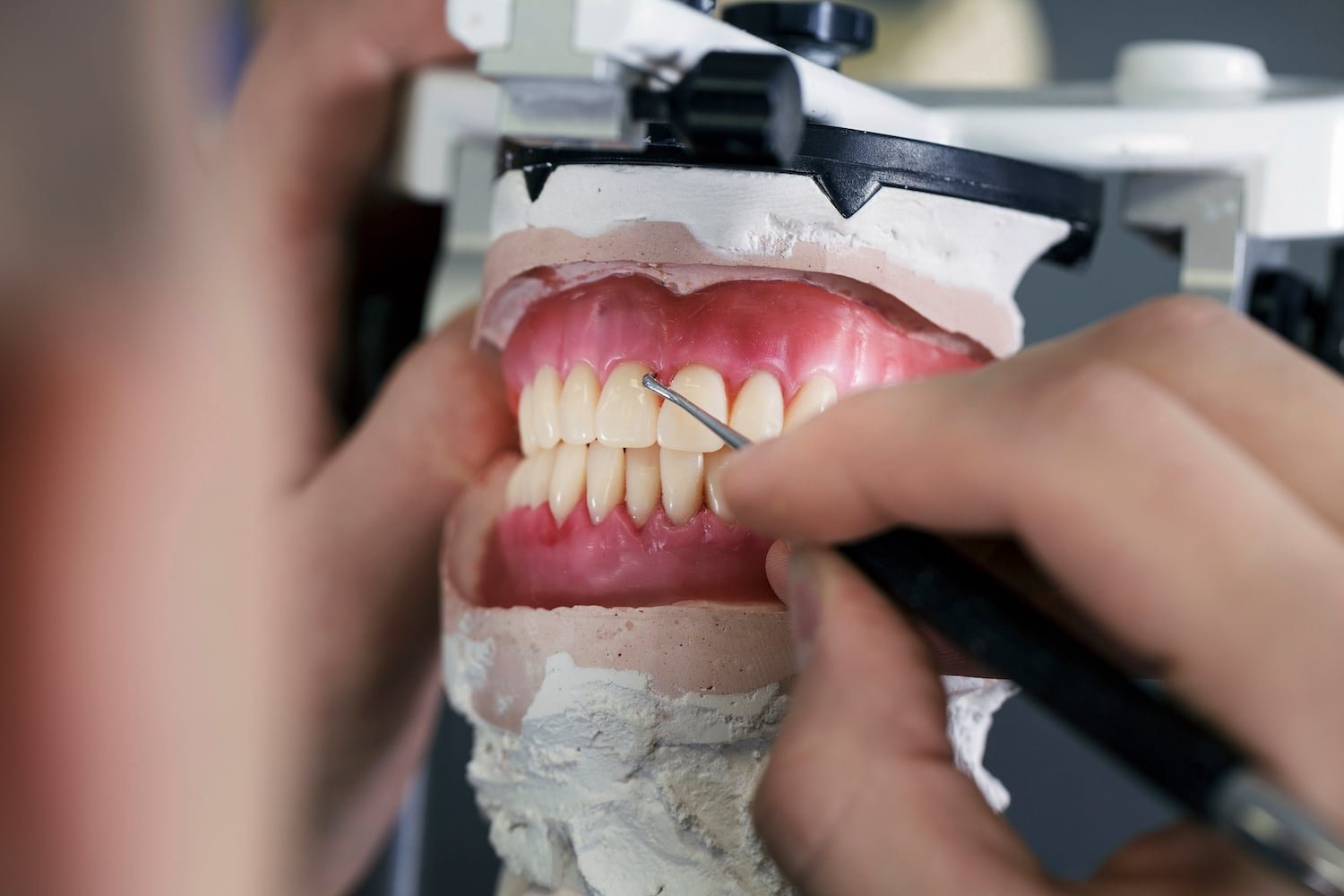More than 36 million Americans don’t have any teeth, and 90% of that population uses dentures. If you’re one of the millions of Americans who rely on dentures, you know how they provide benefits, such as:
- Boosting self-confidence
- Improving oral health
- Ability to talk and eat easier
It’s important to take good care of your dentures, and that includes getting a denture adjustment or repair when needed. If you’re experiencing one of the 10 signs listed below, visit your dentist right away for an adjustment.
1) Denture Discomfort
Your dentures may never feel as natural as your real teeth, especially at the beginning, but they shouldn’t be uncomfortable. If you have persistent discomfort that includes uneven pressure or jaw soreness, be sure to connect with your dentist.
Additionally, sharp pain in your canine teeth when you bite down can indicate bone resorption. Bone resorption is a process where people lose bone mass. The process starts immediately when your teeth are removed. It’s an inevitable process for people without teeth, but it usually requires you to get your dentures re-adjusted.
2) Broken Teeth
If a tooth falls out of your dentures, it’s always best to visit a dentist for a repair. At-home repair kits can work, but if you don’t execute the repair correctly, it can result in a mismatched fit and more problems down the line.

Broken denture teeth are common if you drop your dentures or put too much pressure on them.
3) Difficulty Chewing
One of the best benefits of dentures is that they help you comfortably eat again. There will always be an adjustment period when you first start wearing dentures. But, if you’ve adjusted to your dentures and then, later on, you experience difficulty chewing again, you likely need to refit the dentures to your gums.
4) Cracks or Chips
Sometimes, you may drop your dentures, and they’ll sustain a crack rather than an entire broken tooth. While a chip or crack in your dentures won’t affect their functionality, there can be a safety concern.
Chips often create sharp and uneven surfaces that can cut or otherwise irritate your oral tissue. Visit your denturist and have them fill the cracks right away, so they don’t worsen and cause more issues.
5) Fit Changes
Dentures need to fit perfectly in order for them to feel comfortable.
- Top dentures should suction smoothly to your gums.
- Bottom dentures should float above your bottom gums but easily stay in your mouth.
- Partial dentures should remain in line with natural teeth without too much movement.
If your dentures aren’t fitting as they should, or if the fit has suddenly changed, you should get your dentures adjusted to eliminate the discomfort. Be sure to leave the adjustment in the hands of a professional. Attempting to bend your dentures to readjust them can cause them to crack.
6) Gum Irritation
Once you adjust to your dentures, they should no longer cause any irritation. Whether you start experiencing gum irritation after acclimating to your dentures or if you simply don’t acclimate due to irritation, be sure to visit your dentist.
Inflammation, bleeding, and raw spots can indicate a problem with the denture’s surface. You can also treat these symptoms by brushing your gums and palate twice a day.
7) Pressure or Oral Sores
There are two types of sores that can occur with denture wear: pressure sores and oral sores.
- Pressure sores: These are caused by ill-fitting dentures. If your dentures aren’t well-fitted, they can cause pressure on your mouth. These sores can develop on your gums in areas where pressure is more intense. See your dentist for an adjustment, as pressure should be evenly and comfortably distributed across your dentures.
- Oral sores: Dentures don’t necessarily cause oral sores, but they can make them worse. Sharp surfaces on your dentures can cause canker sores or raw patches of tissue. Additionally, you can develop an oral infection like thrush with denture wear. Stay on top of your oral hygiene to avoid infections.
If you notice any of these sores and they continue to persist, check in with your dentist. You may need to change your care routine or get adjustments.
8) Persistent Stains or Odors
Discoloration can be common with dentures, but stains shouldn’t be significant. Additionally, if you’re following your recommended oral hygiene routine, you shouldn’t experience any odors that linger after a cleaning. If you do, you may have a defective material on your hands.
With either one of these issues, continue to clean and store your dentures as instructed. Your dentist can make any necessary adjustments and counteract any discoloration.
9) Facial Shape Changing
Dentures are supposed to keep your cheeks looking full, just like natural teeth would. Some structural changes occur when bone resorption happens, but if you notice a difference in how your cheeks or jawline look after time, you likely need a denture adjustment.
10) Changing Speech Pattern
Just like when people first get braces, you may experience lisping, slurred speech, or excess saliva when you first get dentures. However, if your speech patterns start to change after you’ve adjusted to your dentures, they probably aren’t fitting correctly. Ill-fitting dentures move around when you talk, which can make it difficult to say certain sounds and words. You likely need a simple realignment in this scenario.
Your Local Denture Partner
Hopefully, you don’t deal with the issues on this list too often, but if you do, be sure to find a trustworthy dentist who can help you out when you need it most. For Minnesota residents, that dentist is Wayzata Dental. Our restorative services help people just like you experience healthy teeth and gums.
If you need help with your dentures, give Wayzata Dental a call today! We’ll help you schedule a convenient appointment.



